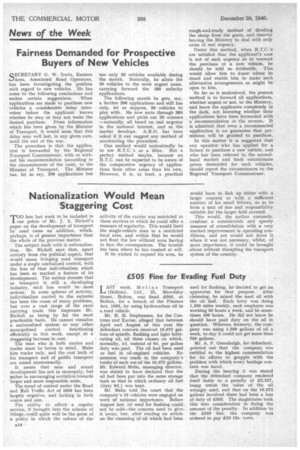Nationalization Would Mean 'Staggering Cost
Page 16

If you've noticed an error in this article please click here to report it so we can fix it.
9-00 late last week to be included in L our precis of Mr. 5. S. Nicholl's paper on the development of transport by road came an addition, which, perhaps, is of greater importance than the whole of the previous matter.
The subject dealt with is nationalization. Mr. Nicholl says that, apart entirely from the political aspect, that would mean bringing road transport under a single centralized control, with the loss of that individualism which has been so marked a feature of its development. The author stresses that as transport is still a developing industry, such loss would bemost serious. In some spheres of activity, individualism carried to the extreme has been the cause of many problems, but over a vast range of the rural carrying trade this impresses Mr. Nicholl as being by far the most practicable basis. He cannot visualize a nationalized system or any other monopolized control functioning efficiently in this work, except at a staggering increase in cost. The man who is both carrier and trader must be borne in mind. Make him trader only, and the cost both of his transport and of public transport are raised unnecessarily.
It seems that sane and sound development lies not in monopoly, but rather in encouraging evolution towards larger and more responsible units.
The trend of control under the Road and Rail Traffic Act of 1933 has been largely negative, and lacking in both vision and aim.
The ability to afford a regular service, if brought into the scheme of things, could quite well be the germ of a policy in which the sphere of the activity of the carrier was restricted to those services in which he could offer a measure of regularity. This would limit the single-vehicle man to a restricted local area, and within that he would not flout the law without soon having to face the consequences. The trouble has been where he has roamed at will.
If he wished to expand his area, he would have to link up either with a larger concern or with a sufficient number of his small fellows, so as to form a unit of size and responsibility suitable for the larger field covered.
This would, the author contends, combine a considerable and speedy measure of consolidation with a very marked improvement in operating conditions, and yet would not force it where it was not necessary, whilst, of more importance, it could be brought ,about without disrupting the transport system of the country.




















































